|

Bookstore home
|
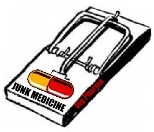
We're right at the
beginning of the
end of the junk-medical era, stimulated in part by the authors whose work
appears below.
If
you want to know the effect of junk medicine, it's cost to you
personally and to the health of nations generally, I highly recommend
the first two books, by John
Abrahamson and Marcia Angel.
One of the reviewers of
one of the books listed below wrote, 'I seriously thought this
book would spark much more heated discussion about national health
coverage.'
Well
it didn't. He thought wrong didn't he. Who did he think was
going to spark the discussion, the medical profession or the pharmaceutical
industry? Duh!
Another reviewer wrote
'The fundamental question
regarding healthcare is: does it promote good health?' Obviously
not. If it did, people would be healthier wouldn't they? Medical costs
would be coming down.
It's definitely
a flawed system and will continue to be while governments continue to
raid the public purse to pay for the treatment of privately generated body system
dysfunctions.
And
you'd have to ask yourself 'Why do people keep buying these medical
and pharmaceutical products and services if they're not becoming
healthier?'
The
strangle hold of the junk medical-pharmaceutical industry (JMPI)
power elite is as strong as ever. The emperor is still walking
around without his pants on. The foxes are still in charge of
the hen house.
Researchers in universities and
institutes of
health depend on pharmaceutical companies for research money.
Who
in their right mind would do themselves out of a job by blowing
the whistle on the futility of producing yet more junk pharmaceuticals,
or stick their head up over the trench and broadcast to the world
news about the inefficacy and side effects of some of the most
popular, block busting drugs of out time; or jeopardise their next
promotion and conference trip by dudding a superior who designed
the ineffective drugs in the first place. Easier to keep the head
down ready to be patted and plough on.
The 2006 report of the Australian Institute of Health and Welfare reads like an apology
for the junk medical-pharmaceutical industry, not a critique. Their opening
statement is 'The health of Australians is getting better.' They then go
on to chronicle how it's getting worse. It's a glossy tome. Backs have
been patted. All's quiet on the Western Front.
The books listed below are from
America, but the long arm of the JMPI makes for the drawing of
interesting parallel's in countries the world over.
John Miller
|
OVERDOSED AMERICA
John Abrahamson
FROM THE PUBLISHER
We all know that health care and
prescription drug costs are skyrocketing. John Abramson, M.D., an
award-winning family doctor on the clinical faculty at Harvard Medical
School, reveals how the corporate takeover of clinical research and
medical practice is compromising Americans' health. You - and your
doctor - will be stunned by his findings.
For twenty years, Dr. Abramson cared for
patients of all ages in a small town north of Boston. But increasingly his
role as family doctor was undermined as pressure mounted to use the latest
drugs and high-tech solutions for nearly every problem. Drawing on his
background in statistics and health policy research, he began to
investigate the radical changes that were quietly taking place in American
medicine.
At the heart of the crisis, he found, lies
the changed purpose of medical knowledge—from seeking to optimize health
to searching for the greatest profits. The lack of transparency that has
become normal in commercially sponsored medical research now taints the
scientific evidence published in even our most prestigious medical
journals.
|

Click on the cover
to
purchase the book.
In what is sure to be one of the most
important and eye-opening books you or your doctor will ever read, John
Abramson offers conclusive evidence that American medicine has broken its
promise to best improve our health and is squandering more than $500
billion each year in the process.
|
|
And unlike the recent scandals in other industries that robbed
Americans of money and jobs, this one is undermining our health.
The hormone replacement debacle, it turns
out, is not an isolated case. The same kind of commercial distortion now
pervades the information that doctors rely upon to guide the prevention
and treatment of common health problems, from heart
disease to stroke, osteoporosis, diabetes, and osteoarthritis.
The good news, as Dr. Abramson explains, is
that the real scientific evidence shows that many of the things that you
can do to protect and preserve your own health are far more effective than
what the drug companies' top-selling products can do for you—which is why
the drug companies work so hard to keep this information under wraps.
|
|
FROM THE PUBLISHER
If you believe that the latest blockbuster medication is worth a premium
price over your generic brand, or that doctors have access to all the
information they need about a drug's safety and effectiveness each time
they write a prescription, Dr. Jerry Avorn has some sobering news.
Drawing on more than twenty-five years of patient care, teaching, and
research at Harvard Medical School, he shares his first-hand experience of
the wide gap in our knowledge of the effectiveness of one medication as
compared to another.
In Powerful Medicines, he reminds us that
every pill we take represents a delicate compromise between the promise of
healing, the risk of side effects, and an increasingly daunting price. The
stakes on each front grow higher every year as new drugs with impressive
power, worrisome side effects, and troubling costs are introduced.
This is a comprehensive behind-the-scenes
look at issues that affect everyone: our shortage of data comparing the
worth of similar drugs for the same condition; alarming lapses in the
detection of lethal side effects; the under-use of life-saving medications;
lavish marketing campaigns that influence what doctors prescribe; and the
resulting upward spiral of costs that places vital drugs beyond the reach
of many Americans.
|
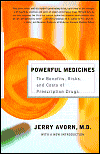
Click on the cover to
purchase the book.
Using clinical case histories taken from his
own work as a practitioner, researcher, and advocate, Dr. Avorn
demonstrates the impressive power of the well-conceived prescription as
well as the debacles that can result when medications are misused. He
describes an innovative program that employs the pharmaceutical industry's
own marketing techniques to reduce use of some of the most over prescribed
and overpriced products.
|
|
Dr. Avorn
asks questions that will interest every consumer: How can a product judged
safe by the Food and Drug Administration turn out to have unexpectedly
lethal side effects? Why has the nation's drug bill been growing at nearly
20 percent per year? How can physicians and patients pick the best
medication in its class? How do doctors actually make their prescribing
decisions, and why do those decisions sometimes go wrong? Why do so many
Americans suffer preventable illnesses and deaths that proper drug use
could have averted? How can the nation gain control over its escalating
drug budget without resorting to rationing or draconian governmental
controls?
Powerful Medicines offers timely and
practical advice on how the nation can improve its drug-approval process,
and how patients can work with doctors to make sure their prescriptions
are safe, effective, and as affordable as possible.
This is a passionate and provocative call
for action as well as a compelling work of clear-headed science.
|
|
Merrill Goozner
FROM THE PUBLISHER
Why do life-saving prescription drugs cost so much? Drug companies insist
that prices merely reflect the millions they invest in research and
development. In this expose, Merrill Goozner contends that American
taxpayers are in fact footing the bill twice: once by supporting
government funded research and again by paying astronomically high prices
for prescription drugs.
Goozner demonstrates that almost all the important
and life-saving new drugs of the past quarter-century actually originated
from research at taxpayer-funded universities and at the National
Institutes of Health. He reports that once the innovative work is over,
the pharmaceutical industry often steps in to reap the profit." "Goozner
shows how drug innovation is driven by dedicated scientists intent on
finding cures for diseases, not by pharmaceutical firms, whose bottom line
often takes precedence over the advance of medicine.
Stories of a
university biochemist who spent twenty years searching for
a single blood
protein that later became the best-selling biotech drug in the world, a
government employee who discovered the causes for dozens of crippling
genetic disorders, and the Department of Energy-funded research that made
the Human Genome Project possible - these accounts illustrate how medical
breakthroughs actually take place."
The $800 Million Pill suggests ways
that the government's role in testing new medicines could be expanded to
eliminate the private-sector waste driving up the cost of existing drugs.
Pharmaceutical firms should be compelled to refocus their human and
financial resources on true medical innovation, Goozner insists.
This book is essential reading for everyone concerned about the
politically charged topics of drug pricing, Medicare coverage, national
health care, and the role of pharmaceutical companies in developing
countries.
|
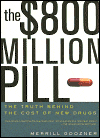
Click on the cover to
purchase the book.
Currently Americans spend a staggering $200
billion each year on prescription drugs. As Dr. Angell powerfully
demonstrates, claims that high drug prices are necessary to fund research
and development are unfounded.
The truth is that drug companies funnel the
bulk of their resources into the marketing of products of dubious benefit.
Meanwhile, as profits soar, the companies brazenly use their wealth and
power to push their agenda through Congress, the FDA, and academic medical
centers.
I highly recommend
this book as a good read.
|
|
|
|
|
David Healy
FROM THE PUBLISHER
Prozac. Paxil. Zoloft. Turn on your television (in
America) and you are likely to see a
commercial for one of the many selective serotonin reuptake inhibitors (SSRIs)
on the market. We hear a lot about them, but do we really understand how
these drugs work and what risks are involved for anyone who uses them?
Let Them Eat Prozac explores the history of SSRIs—from their
early development to their latest marketing campaigns—and the
controversies that surround them. Initially, they seemed like wonder drugs
for those with mild to moderate depression—patients take just one daily
dose, and unlike the tranquilizers that were popular in the 1960s, they
supposedly did not lead to addiction.
Healy draws on his own research and expertise to demonstrate the potential
hazards associated with these drugs. He intersperses case histories with
insider accounts of the research leading to the development and approval
of SSRIs as a treatment for depression.
Let Them Eat Prozac
clearly demonstrates that the problems go much deeper than a disturbing
side-effect of a particular drug. Current FDA regulations encourage drug
companies to patent a specific compound and market it effectively to a
large population on the basis of minimal effectiveness in a handful of
trials.
T
he pharmaceutical industry would like us to believe that SSRIs can safely
treat depression, anxiety, and a host of other mental problems. But as
Let Them Eat Prozac reveals, this "cure" may be worse than the
disease.
|

Click on the cover
to
purchase the book
American expenditures on prescription drugs doubled between 1990 and 2000
and currently account for close to ten percent of total healthcare costs. Goozner, former chief economics correspondent
at the Chicago Tribune, chronicles the actual
clinical process by which new drugs come into being, from basic scientific
research on disease processes conducted at universities and government
labs to the synthesis of new chemicals.
The drug companies explain that they have to put a high price on yesterday's
discoveries if they are going to conduct the research that is required to
develop the next generation of wonder drugs.
But it's bunkum. They spend much more on palm greasing,
back patting, silver-service dinners, trips to resorts and back-handers.
|
|
|
|
|
THE BIG FIX
Katharine Greider
FROM THE PUBLISHER
'Ask your doctor about ...' Americans and Australians now hear
these words coming from their televisions.
In America, ads for prescription drugs are routinely pitched to
consumers with images of hope, terror, or chic -- and they work.
Meanwhile the drugs that many people need in order to stay
healthy are increasingly priced out of their reach.
For all their newfound prominence, pharmaceutical companies have
begun to find themselves in a precarious position. They have
created an impressive array of "mega brands" -- blockbuster
drugs with huge sales -- but when patents expire on those
flagship products, sales suffer dramatically. In order to meet
Wall Street growth expectations drug companies must produce
billions of dollars worth of new revenue - fast.
The best way to do this, they have found, is by charging you
more than you can afford for drugs you may not need, by
investing in a panoply of product-line extensions and me-too
drugs aimed at grabbing market share, and by spending
aggressively on flogging their products in every imaginable
venue. In gives us the full diagnosis of the industry's problems
and machinations.
Could the new
wonder drug actually be making patients worse? |
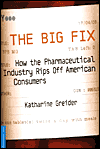
Click on the cover
to
purchase the book.
This very important book will demonstrate beyond your worst dreams that
the commercial needs of Big Pharma are the natural-born enemy of
independent scientific research.
— John Le Carré
When Prozac was released in the late 1980s, David Healy was among the
psychiatrists who prescribed it. But he soon observed that some of these
patients became agitated and even attempted suicide. Studies were soon
published, citing numerous cases in which patients became anxious and
reported increased suicidal thoughts while taking Prozac.
|
|
|
|
|
FROM THE PUBLISHER
The U.S. spends more on
health care than any other nation, yet benefits are shrinking and
life expectancy here is shorter than in countries that spend significantly
less per capita. Meanwhile, HMOs, pharmaceutical companies, and nursing
home operators are reaping tremendous profits. Our elected politicians,
beholden to insurance and drug companies, enact piecemeal measures while
refusing to come to grips with a system on the verge of collapse.
In Critical Condition, Barlett and Steele expose the horror of what health care in America
has become, profiling patients and doctors trapped by the system and
offering startling personal stories that illuminate what's gone wrong.
Doctors tell of being second-guessed and undermined by health-care
insurers; nurses recount chilling tales of hospital meltdowns; patients
explain how they've been victimized by a system that is meant to care for
them. Drug companies profit by forcing hospitals and doctors to use
expensive, brand-name products rather than cheaper generic drugs, while
Wall Street rakes in billions from health-care related industries. And
politicians pass legislation perpetuating the injustices and outright
fraud the system encourages.
Analyzing the industry and offering an insightful prescription for getting
it back on the right track, Critical Condition is
a superb investigative
work that is enormously compelling.
|
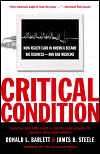
Click on the cover
to
purchase the book.
A New York freelance writer details how
consumers' health and budgets are at the mercy of the monopolistic drug
industry and their abettors, and suggests a first step toward reform. Read this book to find out how the system
works (or doesn't), how the situation got this bad, and whether anything
can be done about it.
|
|
|
|
Ray Strand
FROM THE PUBLISHER
Did you know...
●
The leading drug problem in the U.S. today
is not the use of illegal drugs-it is the use of legal
drugs.
●
The fourth leading cause of death
in the U.S. is properly prescribed and administered medication. By
adding improperly prescribed medication to that equation, it becomes the
third leading cause of death.
●
There are over 2 million hospital
admissions and 180,000 deaths each and every year in the U.S. due
solely to adverse drug reactions
●
When the FDA approves a medication for use
by the general public, less than half of the serious drug reactions are
known. You-the patient-become the final clinical trial.
If you aren't aware of these facts, and you
don't have the tools and information to counter them, you are at risk.
Experienced family doctor Ray Strand writes
his patients prescriptions every week, but he also believes that
prescribing drugs should be a last resort in most medical cases-not a
first choice. In Death by Prescription he provides simple
guidelines to help readers protect themselves and their families from
suffering adverse reactions to prescription medication.
|
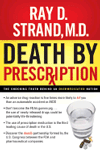
Click on the cover
to
purchase the book.
Death by Prescription is an
absolute page turner, peppered with case histories and heart-retching
stories that blow apart the industry's efforts to conceal the real
dangers posed by drugs.
Opportunity is in the air. Pharmaceuticals
are facing huge uphill battles as they confront dwindling drug
pipelines, devastating lawsuits, and are struggling to cope with the
dawn of genetic medicine which will destroy mass-markets.
|
|
|
|
|
SURVIVING A SUCCESSFUL
HEART ATTACK
Mike Stone
FROM THE PUBLISHER
Mike Stone
survived his heart attack with flying colors, but surviving the statins
was a different matter altogether. This is his story; why he discontinued
taking the statins, what convinced him that it was NOT the cholesterol
that caused his heart attack, and where he is today, several years later.
Well referenced with an excellent
bibliography, "Surviving a Successful Heart Attack", is not only for other
heart attack victims, but for those dedicated professionals in the field
of cardiology as well.
|

Click on the cover
to
purchase the book.
|
|